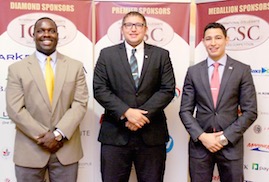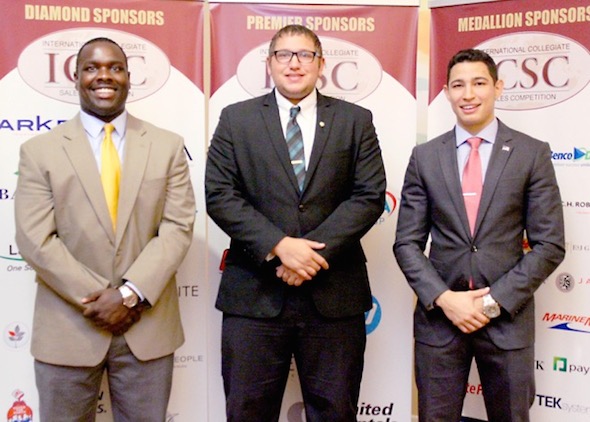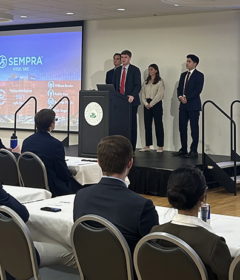Role-Playing: An Important Part of Sales


Wearing out the soles of their shoes was not uncommon for door-to-door salesmen at the turn of the 20th century, often traveling very long distances on foot. Although salespeople still sell with all their hearts and souls, careers in sales have evolved quite a bit since then and play a significant role in any career pursuit.
According to an executive summary from the Florida State University Sales Institute, “Over 50 percent of U.S. college of business graduates entering the work force, regardless of their major, find professional selling as their first career, with over 60 percent of first time sales people either having been reassigned or terminated from their first jobs.”
“Whether they seek sales or marketing as a career or not, all students need to be well versed in the art of selling because the most important thing they will need to know how to sell is–themselves,” said Neal P. Mero, Ph.D., dean of Stetson’s School of Business Administration.
Three members of the Stetson University student chapter of the American Marketing Association (AMA) were selected to compete in two different role-play mock sales scenario competitions: International Collegiate Sales Competition (ICSC) against 60 other universities and American Marketing Association International Collegiate Conference (AMAICC) against 30 other represented universities. Recent graduates Alexander Ferko ’16, double-major in business administration and sport business, and Aaron Matthias ’16, a family enterprise major, competed in the ICSC sales role-play, hosted by FSU, which netted Stetson a ‘rising star’ award. Ferko and another recent Stetson graduate, Bryne Jenkins ’16, marketing major, competed and placed fifth at the AMAICC sales role-play competition.
“Alex, Bryne and Aaron were each hand-selected because of how well they had done in my professional selling class, which focuses on sales role-play,” said Tod Cox, Ph.D., assistant professor of marketing. “I observed them to be very professional, of high emotional intellect, well versed in solid sales competency, in other words, able to meet a scored set of defined sales role-play criteria, such as: meeting opening, client needs identification, product service presentation, overcoming objections, gaining commitment and communication skills.”
“For our students, these competitions were a chance to further enhance and refine their sales skills and compete with top sales and marketing students from other universities,” Cox explained. “However, sponsor companies also look at these competitions as prototype situations to select potential candidates as interns and employees as well.”
AMAICC was sponsored by ABC Supply Company, America’s largest wholesale distributor of roofing, siding, windows and gutters, etc., which brought in its managers and sales people to participate not only as potential customers at a networking luncheon, but then the company’s representatives became the students’ mock clients in the sales role-play, and also their judges. “Sales role-play is a very common sales training technique used in preparing students for the real world,” Cox said.
According to Cox, “The Bureau of Labor Statistics (BLS) reports that, 11 percent of all people are involved in sales. But Daniel Pink, bestselling author of To Sell is Human says, 100 percent of all people are involved in ‘non-selling sales’ and the notion that there is a surprising truth about persuading others when it comes to sales.” Cox explained further, “That is why more sales training classes at the university level are not only needed, but critical.”
Stetson’s AMA chapter recently hosted a discussion session for students to meet with the four member Stetson Sales Executive Panel which included two alumni: Charles Matousek ’76, M.B.A. ’78, associate vice president and financial advisor at Morgan Stanley, DeLand; and Nancy Rummell ’68, IBM‘s first female sales person, along with Alpha Kappa Psi, and the Stetson Sales Team. The panel met with students in the Rinker Auditorium inside the Lynn Business Center, to discuss the potential of selling, the career opportunities in sales and what is at the heart and soul of selling.
“AMA has been a critical counterpart to our sales class at Stetson, teaching us professionalism, mentorship skills and giving us real world sales exposure,” said Jenkins, the chapter’s president. “AMA helped me learn, develop and become an even better leader,” said Ferko. “AMA develops students’ skills so they can create themselves,” Matthias added.
The cohort’s work with the AMA and Stetson’s Alumni Association, process-managed and oversaw the development of Hatter Benefits, a membership program for all Stetson students to save money, market Stetson’s Alumni Association to local business partners, while simultaneously boosting the local economy and promoting sales and networking opportunities for the sales class that must garner the support of the local businesses to secure the success of the program.
“Creating, networking, and ultimately selling Hatter Benefits, allows AMA student members to experience both success and failure in a real world setting,” Matthias said. “Those who learn and cope from failure experience humility, value relationships, ask for feedback and are coachable. Successful people do the things that failures don’t like to do, and that is the defining line between those who create success and those who wait for it to come along.”
These mindsets and strategies have certainly worked for the three 2016 business graduates. Upon graduation, Jenkins started as a broker in training for MACDuff Underwriters, Daytona Beach, a division of Brown and Brown Insurance. Matthias started as an account manager with Insight Global, Orlando, and Ferko is weighing several job offers before making his final decision.
When asked how they see themselves involved as Stetson alumni in the future, all three agreed that they would like to “partner with Professor Cox to organize and generate a sales program; come back and mentor other Stetson marketing students; be alumni ambassadors; and definitely be donors!”
By: Caroline Skinner


